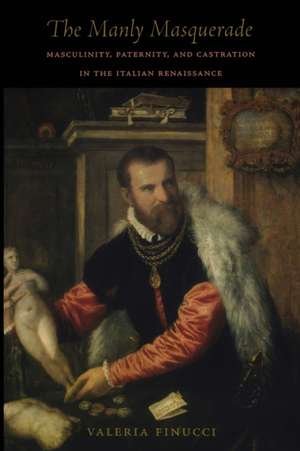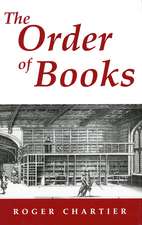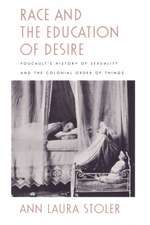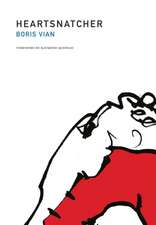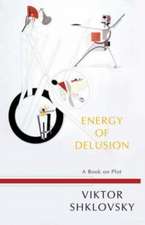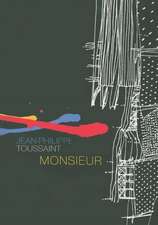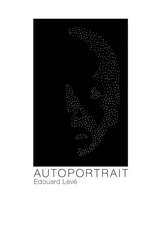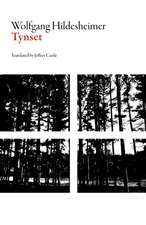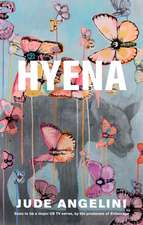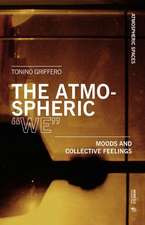The Manly Masquerade – Masculinity, Paternity, and Castration in the Italian Renaissance
Autor Valeria Finuccien Limba Engleză Paperback – 18 mar 2003
Preț: 266.55 lei
Nou
Puncte Express: 400
Preț estimativ în valută:
51.01€ • 55.39$ • 42.85£
51.01€ • 55.39$ • 42.85£
Carte tipărită la comandă
Livrare economică 22 aprilie-06 mai
Preluare comenzi: 021 569.72.76
Specificații
ISBN-13: 9780822330653
ISBN-10: 0822330652
Pagini: 328
Dimensiuni: 153 x 233 x 22 mm
Greutate: 0.51 kg
Editura: MD – Duke University Press
ISBN-10: 0822330652
Pagini: 328
Dimensiuni: 153 x 233 x 22 mm
Greutate: 0.51 kg
Editura: MD – Duke University Press
Recenzii
"An extremely fascinating and original work. Finucci's book questions the traditional concepts associated with the Italian Renaissance (harmony, spiritual perfection and beauty, etc.) and addresses much less 'luminous' aspects of sixteenth-century Italian culture." Armando Maggi, University of Chicago "Valeria Finucci is at it again, patrolling and illuminating the unstable boundaries of sex and gender in early modern Italian culture and literature. Relating canonical literary texts to the medical and legal culture of their times, she explores the fascination that spontaneous generation, cuckoldry, the maternal imagination, androgyny, and the deliberate manufacture of castrati held for early modern Italians--and still hold for us." Walter Stephens, author of Demon Lovers: Witchcraft, Sex, and the Crisis of Belief
Notă biografică
Valeria Finucci is Associate Professor of Italian at Duke University. She is the author of "The Lady Vanishes: Subjectivity and Representation in Castiglione and Ariosto. "She is editor of "Renaissance Transactions: Ariosto and Tasso" and coeditor of "Generation and Degeneration: Tropes of Reproduction in Literature and History from Antiquity to Early Modern Europe," both published by Duke University Press.""
Textul de pe ultima copertă
"Valeria Finucci's book questions the traditional concepts associated with the Italian Renaissance (harmony, spiritual perfection and beauty, etc.) and addresses much less 'luminous' aspects of sixteenth-century Italian culture."--Armando Maggi, author of "Satan's Rhetoric: A Study of Renaissance Demonology"
Cuprins
Acknowledgments ix
Introduction: Body and Generation in the Early Modern Period 1
1. The Useless Genitor: Fantasies of Putrefaction and Nongenealogical Births 37
2. The Masquerade of Paternity: Cuckoldry and Baby M[ale] in Machiavelli's La mandragola 79
3. Performing Maternity: Female Imagination, Paternal Erasure, and Monstrous Birth in Tasso's Gerusalemme liberata 119
4. The Masquerade of Masculinity: Erotomania in Ariosto's Orlando furioso 159
5. Androgynous Doubling and Hermaphroditic Anxieties: Bibbiena's La calandria 189
6. The Masquerade of Manhood: The Paradox of the Castrato 225
Selected Bibliography 281
Index 307
Introduction: Body and Generation in the Early Modern Period 1
1. The Useless Genitor: Fantasies of Putrefaction and Nongenealogical Births 37
2. The Masquerade of Paternity: Cuckoldry and Baby M[ale] in Machiavelli's La mandragola 79
3. Performing Maternity: Female Imagination, Paternal Erasure, and Monstrous Birth in Tasso's Gerusalemme liberata 119
4. The Masquerade of Masculinity: Erotomania in Ariosto's Orlando furioso 159
5. Androgynous Doubling and Hermaphroditic Anxieties: Bibbiena's La calandria 189
6. The Masquerade of Manhood: The Paradox of the Castrato 225
Selected Bibliography 281
Index 307
Descriere
Analyses how the body was constructed and politicized in early modern Italy by exploring literary discourses of the period - plays, novellas, travel journals &poems
